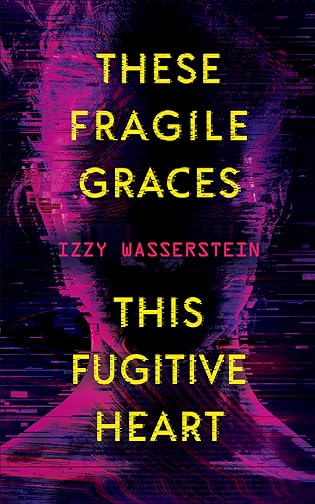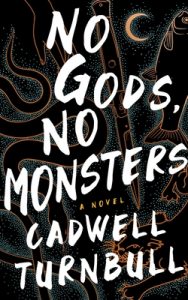 These Fragile Graces, This Fugitive Heart by Izzy Wasserstein
These Fragile Graces, This Fugitive Heart by Izzy Wasserstein Format: eARC
Source: supplied by publisher via Edelweiss
Formats available: paperback, ebook
Genres: dystopian, science fiction, science fiction mystery, technothriller
Pages: 176
Published by Tachyon Publications on March 12, 2024
Purchasing Info: Author's Website, Publisher's Website, Amazon, Barnes & Noble, Kobo, Bookshop.org, Better World Books
Goodreads
In a queer, noir technothriller of fractured identity and corporate intrigue, a trans woman faces her fear of losing her community as her past chases after her. This bold, thought-provoking debut science-fiction novella from a Lambda Award finalist is an exciting and unpredictable look at the fluid nature of our former and present selves.
In mid-21st-century Kansas City, Dora hasn’t been back to her old commune in years. But when Dora’s ex-girlfriend Kay is killed, and everyone at the commune is a potential suspect, Dora knows she’s the only person who can solve the murder.
As Dora is dragged back into her old community and begins her investigations, she discovers that Kay’s death is only one of several terrible incidents. A strange new drug is circulating. People are disappearing. And Dora is being attacked by assailants from her pre-transition past.
Meanwhile, It seems like a war between two nefarious corporations is looming, and Dora’s old neighborhood is their battleground. Now she must uncover a twisted conspiracy, all while navigating a deeply meaningful new relationship.
Amy and Marlene’s Joint Review:
Amy: After the downfall of most governments in the US, the gap between the haves and the have-nots has gotten even bigger. In a time not too far past our own, in a mostly-dead downtown Kansas City, a young transwoman named Dora gets a visit from an old friend. Her former lover, who still lived in the commune Dora left, is dead. She goes to see, to say goodbye, and discovers that it wasn’t just an overdose — it was a murder. She’s determined to figure it all out, but while she’s walking around her old neighborhood, looking for clues and thinking things over, she gets jumped by a stranger who looks an awful lot like she used to…
From the Department of Fair Warnings: This book has a non-zero amount of bloody murders in it. It’s a murder mystery, yanno? You know to expect that. Also one brief sex scene, that I did not expect, and that might catch some readers by surprise by its strangeness.
Marlene: SF mystery is seriously becoming a ‘thing’, and I’m very much here for it in general – both because I love genre blends AND because SF mystery in particular gets to use its blending to query both sides of its equation. The SF pokes at the mystery elements and the mystery elements poke at the SF.
This particular combination of the two is very much of the Earth-bound, scientific laboratory wing of the SF genre, to the point where it would probably make a great intro to SF for someone who is primarily a mystery/suspense/thriller reader, as the SFnal elements are familiar in a post-apocalyptic, dystopian sort of way. It’s not that far from now in either time or circumstances and that makes the story easy to slip into.
Dora’s world is pretty much fucked, and that’s pretty clear from the get-go. She may have thrown her own set of torches into the conflagration, but her Kansas City – particularly her part of it – is very much on its way down towards a clearly yawning abyss.
She’s burned her bridges behind her, one righteously, and the other maybe not so much. Her dad wanted the boy she was assigned to be at birth – and she couldn’t be that. He’s also a douche in general which makes him REAL easy to hate. OTOH, she’s also cut herself off from the commune community that represented both family and safety. A split that had a lot of hurt and betrayal in it then – and still does when the story begins.
The mystery that Dora is compelled to solve is the same thing that caused her split from the community in the first place, and it’s a question as old as time – or at least as old as this quote from Benjamin Franklin, the one about the willingness to give up “essential liberty to purchase a little temporary safety deserve neither liberty nor safety.”
The commune has a habit of trusting people and letting people in who arguably should have been vetted a bit better first. They were, and are, unwilling to make that trade off of liberty for safety – even though it has bitten them in the ass before and quite likely has again.
But this time, the threat came from a direction none of them would ever have expected, and it’s up to Dora to unravel the mystery that has been festering – both under the city and in her own past – all along.
Amy’s Rating A: Dora has a lot to figure out, and she gets right to it. This story rocks along fast; if you’re like me, you’ll start reading, and not stop until you’re done, which won’t take terribly long. The first unfriendly stranger startled her, but when the second one shows up, and also looks rather like she would have if she had not transitioned, she starts putting the pieces together. Like all good mysteries, she’s got to sort out the who, the what, the where, and the why; the where comes first, and the remaining pieces fall into place in quick order thereafter. On its face, it’s a fine high-speed murder mystery, complete with a deeply flawed hero and a somewhat unsurprising, even more-flawed villain.
But Izzy Wasserstein has buried something deeper to think about in this tale. When presented with her clone, Dora looks at and interacts with — and even gets intimate with — someone who might have been her, if her father had gotten his way, and she’d been the son he always wanted. The interaction between this imperfect clone of her pre-transition body, and her own traumatized persona, gives me (as a queer transwoman myself) a great deal to think about: How would things have been different if I were not who I am? And how crucial to the person I have become was my transition, and my life experiences since then? It hearkens back to the whole “nature or nurture” question that mankind has pondered for a long, long time. Are we, in fact, born this way, destined to be who we are?
Obviously, it’s not an either-or question; there are shades and nuances throughout, and Wasserstein shows us some of that in her portrayal of the clone. They are imperfect, programmed from the time they came out of the tanks to be a violent killer and think of Dora as a “traitor.” Yet they don’t kill her, and they discuss with Dora at some length their “fighting their instincts” to become their own person.
So, really, there are two stories hidden in this short book: a straightforward, well-crafted cyberpunk whodunnit, and the story of a transperson squaring off with a clone of herself. Two good, thought-provoking stories under one cover…what’s not to like?
Marlene’s Rating A-: I tend to rate novellas at the A- level a LOT of the time and this book is no exception. I love the novella length because it’s fast to read, but that length means that a lot of backstory gets left on the proverbial cutting room floor because there isn’t space for it. In other words, as much as I totally got where Dora was personally coming from, how our world got fucked up into hers that fast needed a couple more steps for me to buy into it.
 I also would have loved a bit more about the anarchist and commune movement as it applied to this particular story, because I was basing all of my knowledge and acceptance of the way that part of their world worked on Cadwell Turnbull’s fantastic Convergence Saga; No Gods, No Monsters and We Are the Crisis, because that near-future SF tale is also rooted a bit in the coop/commune movement – although with a completely different crisis and in an entirely different way.
I also would have loved a bit more about the anarchist and commune movement as it applied to this particular story, because I was basing all of my knowledge and acceptance of the way that part of their world worked on Cadwell Turnbull’s fantastic Convergence Saga; No Gods, No Monsters and We Are the Crisis, because that near-future SF tale is also rooted a bit in the coop/commune movement – although with a completely different crisis and in an entirely different way.
The mystery part of this mystery wasn’t quite as mysterious as it might have been. Once the cadres of poorly programmed almost-Theodores started chasing after Dora it was really obvious that they were clones AND that her dad was the mad scientist (and he so was!) creating them. No matter what his employer or moneybags might have intended them to do or be.
Howsomever, the questions that Dora asks herself are the part of the story that sticks in the mind after the last page is turned – and they turned out to be considerably more fascinating than merely ‘whodunnit’.
As Amy said, it’s that age-old question of ‘nature vs. nurture’ along with a heaping helping of what does it mean to be ‘born that way’ – whatever way that may be in the mind of the person, and whether the answer to that question is based on innate characteristics or parental or societal expectations or fate or destiny.
Dora confronts those questions, not just in her own mind, but in her relationship with one of her almost-clones and that clone’s willingness to throw off their own programming. And that’s the fragile grace that gives this story its heart.
